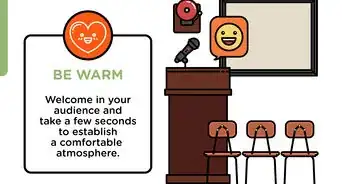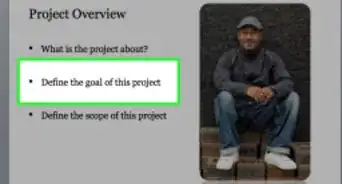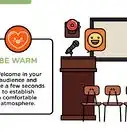X
wikiHow is a “wiki,” similar to Wikipedia, which means that many of our articles are co-written by multiple authors. To create this article, 15 people, some anonymous, worked to edit and improve it over time.
This article has been viewed 120,790 times.
Learn more...
College Seminars are conducted to test the presentation skills of a student or a group and also allow the student to convey their knowledge to the audience. When students don't come prepared, the presentation may become disorganized, unclear, and dull. It would make them confused during the presentation and lead to vague answers during the questionnaires.
Steps
-
1Connect with your audience. "Preparation" is the most important task one has to do when it comes to "presentation." Being prepared and having good knowledge about the topic that is to be presented will create interest among the audience and will not let them sleep all throughout your presentation. Capture the attention of your audience. Create soft humor which will add a boost to your interaction with them.[1]
-
2Be studious. Presentations usually involves PowerPoint slides. It is important to select the right font, font size, and theme of the slides. Keep it formal![2]Advertisement
-
3Be interactive. Involve the audience. Ask them few questions related to your topic. Keep it Short though because overdoing it would like Debate rather than Presentation.
-
4Look at the audience when you are talking about the topic. If you are distracted by someone, look at another side of the audience. Don't just read out the key points from the slides because the audience isn't blind.[3]
-
5Manage your time. The presentation should last for the time given to you. Don't extend the presentation, since there are others waiting for their chance too. Practice your presentation a handful of times to ensure your content and talking speed is under time.[4]
-
6Encourage your peers. Helping your friends if they find it hard to give the presentation will boost your skills since you get to know the difference in a good and a bad presentation.
-
7Answer and don't question. When you are done with the presentation, it is time for a round of questions. When questioned, don't give vague answers, make sure your answer is simple and clearing everything which is asked and never question the person who is questioning you. It will be an insult to them.[5]
-
8Ask for feedback from the audience. This helps you know what went wrong or if you have given a good presentation.
Advertisement
Community Q&A
-
QuestionHow can I avoid being nervous during my presentation?
 Community AnswerPersonally, I would recommend thinking of something that makes you happy, or something that makes you laugh. If that doesn't work, try to speak encouraging words to yourself for motivation. There are also some articles on wikiHow that can help you manage your nerves, like How to Avoid Being Nervous and How to Deal with Being Nervous.
Community AnswerPersonally, I would recommend thinking of something that makes you happy, or something that makes you laugh. If that doesn't work, try to speak encouraging words to yourself for motivation. There are also some articles on wikiHow that can help you manage your nerves, like How to Avoid Being Nervous and How to Deal with Being Nervous. -
QuestionAre project presentations mandatory in college?
 Pink_StarCommunity AnswerPresentations may not be mandatory in every class, but it's almost a guarantee that during at least one of your classes in college, you'll have to give a presentation.
Pink_StarCommunity AnswerPresentations may not be mandatory in every class, but it's almost a guarantee that during at least one of your classes in college, you'll have to give a presentation. -
QuestionHow can I make the audience eager to listen to my topic?
 Community AnswerUnfortunately, you can't make anyone listen to your topic, but you can do things that might help keep them engaged. Try to be enthusiastic, memorize your speech, and maintain eye contact. Also, try to make the sound/tune of your voice sound more enthusiastic than the topic really is.
Community AnswerUnfortunately, you can't make anyone listen to your topic, but you can do things that might help keep them engaged. Try to be enthusiastic, memorize your speech, and maintain eye contact. Also, try to make the sound/tune of your voice sound more enthusiastic than the topic really is.
Advertisement
Warnings
- Answer the questions asked after the presentation. Do not divert or change the topic.⧼thumbs_response⧽
Advertisement
References
- ↑ https://education.seattlepi.com/give-good-speech-presentations-college-1147.html
- ↑ http://blog.online.colostate.edu/blog/online-education/presentation-tips-for-college-students/
- ↑ http://blog.online.colostate.edu/blog/online-education/presentation-tips-for-college-students/
- ↑ https://education.seattlepi.com/give-good-speech-presentations-college-1147.html
- ↑ https://www.princeton.edu/~archss/webpdfs08/BaharMartonosi.pdf
About This Article
Advertisement





























































